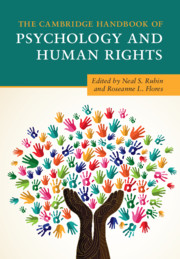Book contents
- The Cambridge Handbook of Psychology and Human Rights
- The Cambridge Handbook of Psychology and Human Rights
- Copyright page
- Dedication
- Contents
- Figures
- Tables
- Boxes
- Contributors
- Acknowledgments
- The Core International Human Rights Instruments and Their Monitoring Bodies
- Universal Human Rights Instruments
- Sustainable Development Goals
- Glossary of United Nations and Psychology Acronyms in the Handbook
- Introduction
- Part I History of Human Rights
- Part II The Intersection of Psychology and Human Rights
- Part III Contemporary Issues in Psychology and Human Rights
- 12 Mental Health and Human Rights
- 13 Cultivating Our Common Humanity
- 14 From Refugees to Immigrants
- 15 UN Convention on the Rights of the Child and the Sustainable Development Goals
- 16 The Global Contributions of Psychology to Understanding and Addressing the Non-negotiability of Human Dignity and Health Equity
- 17 Human Rights and Psychology from Indigenous Perspectives
- 18 Human Trafficking
- 19 Human Rights Seen through a Cultural Lens
- 20 Human Rights and Well-Being of Older Persons
- 21 Reproductive Justice, Psychology, and Human Rights
- 22 Psychology and the Global Human Rights Agenda on Sexual Orientation and Gender Identity
- 23 Psychosocial Features of Movements That Have Advanced Human Rights
- 24 Principles of Care of Survivors of Organized Violence in a Global Society
- 25 Mental Health and Psychosocial Support in Humanitarian Settings
- 26 Children and Violence across the Life Span
- 27 Psychology and Human Rights in the Age of Genomics and Neuroscience
- 28 Behavioral Insights, Public Policy, and Human Rights
- 29 From Human Resources to Human Rights
- 30 Climate Change
- Part IV Teaching, Research, and Training in Psychology and Human Rights
- Part V Future Directions
- Index
- References
14 - From Refugees to Immigrants
The Role of Psychology in the Struggle for Human Rights
from Part III - Contemporary Issues in Psychology and Human Rights
Published online by Cambridge University Press: 02 October 2020
- The Cambridge Handbook of Psychology and Human Rights
- The Cambridge Handbook of Psychology and Human Rights
- Copyright page
- Dedication
- Contents
- Figures
- Tables
- Boxes
- Contributors
- Acknowledgments
- The Core International Human Rights Instruments and Their Monitoring Bodies
- Universal Human Rights Instruments
- Sustainable Development Goals
- Glossary of United Nations and Psychology Acronyms in the Handbook
- Introduction
- Part I History of Human Rights
- Part II The Intersection of Psychology and Human Rights
- Part III Contemporary Issues in Psychology and Human Rights
- 12 Mental Health and Human Rights
- 13 Cultivating Our Common Humanity
- 14 From Refugees to Immigrants
- 15 UN Convention on the Rights of the Child and the Sustainable Development Goals
- 16 The Global Contributions of Psychology to Understanding and Addressing the Non-negotiability of Human Dignity and Health Equity
- 17 Human Rights and Psychology from Indigenous Perspectives
- 18 Human Trafficking
- 19 Human Rights Seen through a Cultural Lens
- 20 Human Rights and Well-Being of Older Persons
- 21 Reproductive Justice, Psychology, and Human Rights
- 22 Psychology and the Global Human Rights Agenda on Sexual Orientation and Gender Identity
- 23 Psychosocial Features of Movements That Have Advanced Human Rights
- 24 Principles of Care of Survivors of Organized Violence in a Global Society
- 25 Mental Health and Psychosocial Support in Humanitarian Settings
- 26 Children and Violence across the Life Span
- 27 Psychology and Human Rights in the Age of Genomics and Neuroscience
- 28 Behavioral Insights, Public Policy, and Human Rights
- 29 From Human Resources to Human Rights
- 30 Climate Change
- Part IV Teaching, Research, and Training in Psychology and Human Rights
- Part V Future Directions
- Index
- References
Summary
We can take people out of wars, but we cannot take wars out of people. When individuals are the victims of political traumas and human rights violations, they not only endure difficult journeys to get to safety, but they are also often received with hostility in the host countries.
As per Ignacio Martin-Baro, the role of a psychologist is to enhance the human condition. We base this chapter on idea and describe a model for psychologists’ roles in the resettlement of refugees, where the individual is supported in moving from refugee status to immigrant status. Psychologists have various roles in different phases, from providing basic information and guidance about resources in the first phase of preparation to empowering, motivating, and advocating for refugees in the second phase of transition, followed by assessing refugees’ needs and being part of community interventions in the third arrival phase and ending with clinical care for those with adjustment problems in the settlement phase.
Finally, the chapter ends with a discussion about evidence-based practice, a review of the intersection between social justice and psychologists’ work, and a brief history of how the American Psychological Association has embodied that in recent years.
- Type
- Chapter
- Information
- The Cambridge Handbook of Psychology and Human Rights , pp. 212 - 226Publisher: Cambridge University PressPrint publication year: 2020
References
- 2
- Cited by

